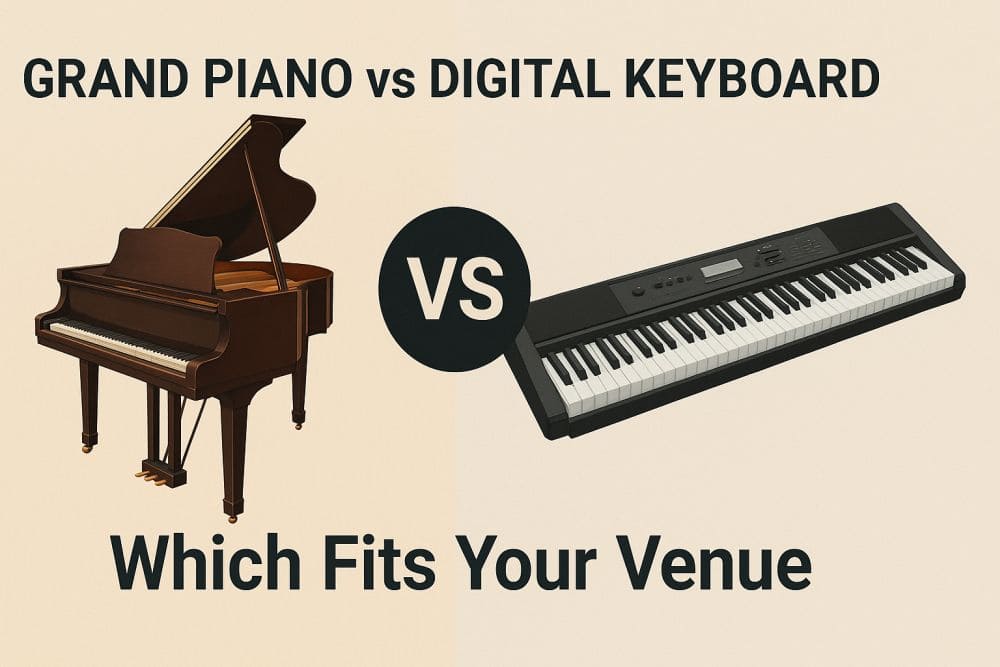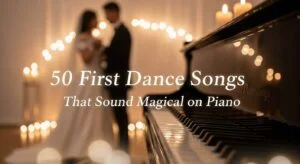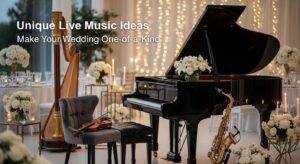When planning your special event, one of the most critical decisions you’ll face is choosing the right piano for your venue. As a professional pianist with over 20 years of experience performing at weddings, corporate events, and special celebrations across New Jersey, NYC, and Philadelphia, I’ve encountered every possible venue scenario and piano configuration imaginable.
The grand piano vs digital keyboard debate isn’t just about personal preference—it’s about understanding how each instrument fits your specific venue’s needs, acoustic properties, and logistical requirements. Whether you’re planning an intimate cocktail party or a grand wedding celebration, the choice between an acoustic piano and a digital piano can significantly impact your event’s success.
“After performing on everything from concert grand pianos in prestigious venues to high-end digital keyboards in outdoor settings, I’ve learned that the best piano is the one that serves your event’s unique needs,” says Arnie Abrams, award-winning pianist and entertainer. “It’s not always about having the most expensive instrument—it’s about having the right instrument for your venue and occasion.”
Understanding the Fundamental Differences
🎹 Grand Piano vs Digital Piano: Quick Comparison
🎼 Acoustic Grand Piano
⚡ Digital Piano
💡 Pro Tip: The best choice depends on your venue’s acoustics, budget, and event requirements!
The Acoustic Piano Experience
Acoustic pianos, whether grand piano or upright piano models, create sound through a complex mechanical action system. When you press a key, a hammer strikes strings, creating vibrations that resonate through the piano’s wooden soundboard. This acoustic instrument produces what many consider the most authentic piano sound possible.
Understanding the mechanism of an acoustic piano is crucial when comparing options. The acoustic grand piano action involves hundreds of precisely calibrated parts working together to translate your touch into musical expression. This real piano experience cannot be fully replicated, though modern technology comes remarkably close.
Grand pianos come in several sizes:
- Baby grand piano (5’0″ to 5’7″) – Perfect for medium-sized venues
- Medium grand (5’8″ to 6’2″) – Ideal for larger performance spaces
- Concert grand piano (6’3″ to 9’0″) – The pinnacle of acoustic piano design
Upright acoustic pianos offer a more compact alternative while still providing the real acoustic experience that many pianists and audiences prefer. When deciding between upright or grand configurations, consider your venue’s space constraints and acoustic properties.
The feel of an acoustic piano includes subtle nuances like the natural resistance of piano keys, the organic response of the action mechanism, and the way the instrument “breathes” with your playing style. These characteristics make acoustic counterparts irreplaceable in certain performance contexts.
The Digital Piano Revolution
Modern digital pianos use advanced modeling synthesis engines and multi-sample mapping to recreate the sound of acoustic pianos. Today’s high-end digital pianos feature weighted key action, hammer action simulation, and sophisticated polyphony counts that can rival their acoustic counterparts in many performance situations.
The average digital piano has evolved dramatically from early electric piano models. Contemporary digital piano models employ cutting-edge technology to bridge the gap between convenience and authenticity. Many digital pianos now offer features that even surpass traditional acoustic capabilities in certain applications.
When comparing a digital piano vs acoustic options, consider that modern digital pianos incorporate sampled piano sounds recorded from world-class instruments. The best models of digital pianos use high-end digital processing to recreate not just the piano sound, but also the feel of an acoustic instrument.
Key digital piano features include:
- Graded hammer standard key action
- Synthetic ivory keys for authentic feel
- Triple sensor keys for enhanced responsiveness
- Escapement feel that mimics acoustic piano action
- Pedal resonance modeling for realistic sustain effects
- Velocity layers for dynamic expression
- High dynamic range audio processing
Digital pianos and keyboards often blur the lines between piano or keyboard categories. A quality digital piano or keyboard can serve multiple roles, functioning as both a practice instrument and performance tool.
“The quality gap between acoustic and digital pianos has narrowed dramatically,” notes Arnie Abrams. “Some of the high-end digital piano models I work with now are so sophisticated that even experienced musicians are amazed by their authenticity. The question isn’t whether a piano is better than a keyboard anymore—it’s about which type of piano is best for your specific needs.”
Venue-Specific Considerations
Small Intimate Venues
For intimate venues with limited space, the choice between upright or grand acoustic pianos versus portable digital piano options becomes crucial. Space-saving design is often the determining factor in venues like:
- Private homes
- Small restaurant settings
- Boutique hotels
- Intimate ceremony locations
Digital piano advantages in small venues:
- Minimal stage footprint
- No climate control requirements
- Weight and portability benefits
- Headphone practice mode for sound checks
- Volume control for sound management
Large Event Spaces
Grand ballrooms, concert halls, and large wedding venues present different challenges. The venue acoustic considerations become paramount when deciding between a real grand piano and digital alternatives.
Acoustic piano benefits in large venues:
- Natural acoustic sound projection
- Sympathetic vibration and resonance
- Visual impact and elegance
- Concert grand presence for formal events
Digital piano solutions for large venues:
- External amplification capabilities
- Line output jacks for professional sound systems
- Bluetooth MIDI connectivity for enhanced features
- Audio interface integration for recording
Outdoor Venues
Outdoor wedding music presents unique challenges that often favor digital solutions. Weather exposure, humidity control system requirements, and moving and transport costs make acoustic pianos problematic for outdoor events.
Digital piano advantages outdoors:
- Weather resistance
- Onboard speakers or easy amplification
- Battery power options (some models)
- Quick assembly and setup
- No regular tuning schedule concerns
Sound Quality Analysis
Acoustic Piano Sound Characteristics
The piano sound from an acoustic grand piano offers several unique qualities that define the sound of acoustic pianos:
- Natural dynamic range and velocity layers
- String resonance modeling occurs naturally through physical sympathetic vibrations
- Damper pedal realism with half pedal support
- Key off samples happen organically as hammers fall away from strings
- Infinite polyphony (no note cutting)
- Grand piano sound projection that fills large spaces naturally
The acoustic sound produced by a real grand piano includes subtle harmonics and overtones that create the rich, complex timbre that many consider the gold standard. Acoustic upright pianos provide similar tonal qualities in a more compact format, though with different resonance characteristics.
When you play piano on an acoustic instrument, you’re interacting with the mechanism of an acoustic piano that has remained fundamentally unchanged for over a century. This consistency has made acoustic pianos the reference point for all piano sound reproduction.
Digital Piano Sound Technology
Digital pianos on the market employ increasingly sophisticated sound sampling techniques to replicate acoustic sound:
- High dynamic range recording of real acoustic pianos
- Multiple velocity layers for expressive playing (often 10+ layers)
- Advanced polyphony counts (256+ notes on premium models)
- String resonance modeling through digital processing
- Sostenuto function and pedal modeling
- Sympathetic vibration simulation
- Key off samples recorded from actual piano releases
The best digital pianos now incorporate modeling synthesis engines that don’t just play back recordings—they model the physical behavior of piano strings, soundboards, and resonance chambers in real-time. This technology helps high-end digital pianos come close to replicating the complex acoustic interactions of a real acoustic instrument.
Many digital models now include multiple piano voices with different characteristics—you might find classical piano voices, jazz-optimized sounds, and even period-specific historical piano recreations all in one instrument.
“When I’m performing jazz trio gigs in venues with excellent acoustics, nothing quite matches the organic response of a real acoustic piano,” explains Arnie Abrams. “However, for holiday parties in hotel lobbies or outdoor celebrations, a high-quality digital piano often provides superior results due to environmental control and sound consistency. The key is understanding that each type of piano serves different purposes.”
Technical Features Comparison
Key Action and Touch
Acoustic piano action provides the ultimate reference point:
- Physical hammer action with escapement
- Variable touch response based on playing technique
- Natural key weighting variation
- Mechanical feedback and resistance
Digital piano key action has evolved significantly:
- Weighted key action that simulates acoustic feel
- Graded hammer standard across the keyboard
- Adjustable touch sensitivity settings
- Triple sensor keys for accurate note detection
Pedal Systems
Acoustic piano pedals:
- Damper pedal with natural half pedal support
- Sostenuto function (on grand pianos)
- Una corda (soft pedal) for tonal variation
- Mechanical connection provides authentic resistance
Digital piano pedals:
- Pedal resonance modeling technology
- Half pedal support on premium models
- Damper pedal realism through advanced sampling
- Sostenuto function available on high-end models
Connectivity and Modern Features
Digital pianos excel in modern connectivity:
- USB Type-C port for computer connection
- Bluetooth MIDI connectivity for wireless control
- Mobile app control for settings and features
- Recording capability with internal memory
- Built-in metronome and practice tools
- Layer and split functions for versatility
- Transpose feature for key changes
Acoustic pianos offer traditional benefits:
- No technology dependence
- Future resale value often higher
- Classic aesthetic appeal
- No firmware updates required
Cost Considerations
Initial Investment
Acoustic piano costs:
- Baby grand piano: $15,000 – $100,000+
- Upright acoustic: $3,000 – $25,000+
- Concert grand: $100,000 – $200,000+
Digital piano costs:
- Entry-level: $500 – $2,000
- High-end digital piano: $3,000 – $15,000
- Stage piano models: $1,500 – $8,000
Ongoing Expenses
Acoustic piano maintenance:
- Regular tuning schedule (3-4 times yearly): $100-200 per tuning
- Climate control requirements and humidity control system
- Maintenance expenses for regulation and repairs
- Moving costs for venue changes
Digital piano maintenance:
- Minimal ongoing costs
- Occasional firmware updates
- No tuning required
- Weight and portability reduce moving expenses
Performance Applications
Classical Recitals and Formal Events
Classical recitals venue requirements often favor acoustic instruments:
- Concert grand piano provides optimal sound projection
- Traditional aesthetic matches formal settings
- Acoustic counterparts to orchestral instruments
- Real piano authenticity for classical repertoire
Contemporary and Jazz Performance
Modern performance styles benefit from digital flexibility:
- Electric piano sounds for jazz and contemporary music
- Layer and split functions for complex arrangements
- Recording capability for live performance capture
- External amplification for band settings
Wedding and Event Entertainment
Live wedding music requires adaptability:
- Venue acoustic considerations vary widely
- Moving and transport costs affect feasibility
- Sound quality consistency across different venues
- Weather-ready solutions for outdoor ceremonies
Venue-Specific Recommendations
Houses of Worship
Worship service music venues present unique considerations:
- Acoustic piano traditional preference
- Digital piano flexibility for contemporary services
- Headphone practice mode for rehearsals
- Recording capability for service documentation
Educational Settings
School music program and teacher studio needs require specific features:
- Beginner friendly features on digital models
- Advanced pianist demands met by both instrument types
- Built-in metronome for practice sessions
- Headphone practice mode for quiet study
Healthcare and Senior Facilities
Senior center live entertainment benefits from digital piano features:
- Volume control for hearing comfort
- Easy transport between facilities
- Reliable tuning without maintenance delays
- Familiar acoustic sound through quality sampling
Commercial Venues
Hotel lobby elegance and restaurant ambiance require careful instrument selection:
- Furniture style console digital pianos blend seamlessly
- Polished ebony finish or satin walnut cabinet options
- Silent play system for practice without disruption
- Volume control for varying crowd sizes
“In my experience performing at restaurants throughout New Jersey, the best piano choice depends entirely on the venue’s character and acoustic properties,” notes Arnie Abrams. “A cozy bistro might benefit from an intimate upright piano, while a modern hotel lobby might be better served by a sophisticated digital piano with cabinet finish options that complement the décor.”
Making the Right Choice for Your Event
Assessment Questions
Before deciding between acoustic vs digital pianos, consider:
- What’s your venue’s size and acoustic properties?
- Do you need weather resistance for outdoor events?
- What’s your budget for instrument and maintenance?
- How important is visual aesthetics vs. functionality?
- Will you need recording or amplification capabilities?
Professional Consultation
When planning your event, consult with experienced musicians who understand both acoustic and digital pianos. A professional pianist can assess your venue and recommend the optimal instrument choice based on:
- Venue acoustic considerations
- Performance requirements
- Sound quality expectations
- Budget constraints
- Logistical factors
Future-Proofing Your Decision
Consider long-term factors when choosing the right piano:
- Future resale value of acoustic instruments
- Technology advancement in digital models
- Changing venue requirements over time
- Maintenance expenses and accessibility
The Yamaha Standard and Manufacturer Comparison
Yamaha has established industry standards in both acoustic and digital piano categories, but the modern market includes many excellent manufacturers:
Yamaha Piano Excellence
Yamaha Acoustic Pianos:
- C Series grand piano models (entry to professional level)
- U Series upright piano options (space-efficient designs)
- CF Series concert grand instruments (world-class performance)
Yamaha Digital Pianos:
- Clavinova series with graded hammer standard
- P Series portable digital piano models
- CLP series furniture style console instruments
- AvantGrand hybrid piano technology
Other Leading Manufacturers
Kawai offers exceptional acoustic and digital options:
- GX Series grand pianos competing with top-tier instruments
- CA Series digital pianos with wooden key construction
- MP Series stage piano models for professionals
Roland specializes in innovative digital piano technology:
- SuperNATURAL modeling synthesis engine
- Advanced hammer action simulation
- Professional stage piano solutions
Steinway represents the pinnacle of acoustic piano craftsmanship:
- Concert grand piano instruments used in major venues worldwide
- Spirio player piano technology
- Baby grand and upright models for discerning pianists
Hybrid Piano Technology
Hybrid piano instruments combine acoustic and digital technologies:
- Real acoustic grand piano action with digital sound generation
- Silent play system allows acoustic or digital modes
- Piano sound switching between acoustic and sampled voices
- Premium cabinet finish options maintain aesthetic appeal
These instruments represent the cutting edge of piano technology, offering the feel of an acoustic piano with digital convenience.
Technology Integration
Recording and Production
Modern events increasingly require recording capabilities:
- Digital piano models offer direct audio interface integration
- USB Type-C port connectivity for professional recording
- MIDI functionality for post-production editing
- Multi-track recording possibilities
Smart Features
Contemporary digital pianos include intelligent features:
- Mobile app control for remote adjustments
- Firmware updates for continuous improvement
- Bluetooth connectivity for wireless operation
- Cloud integration for music libraries
Environmental Considerations
Climate Control
Acoustic pianos require strict environmental management:
- Humidity control system maintenance
- Temperature stability for tuning retention
- Regular tuning schedule adjustments for seasons
- Climate control requirements increase operational costs
Digital pianos offer environmental stability:
- Weather resistance for outdoor use
- Consistent performance across temperature ranges
- No humidity-related tuning issues
- Portable solutions for changing venues
Expert Recommendations by Venue Type
Intimate Wedding Ceremonies
For intimate wedding ceremony music:
- Baby grand piano in controlled indoor environments
- High-end digital piano for flexibility and reliability
- Upright piano for vintage or rustic venues
- Portable digital piano for destination weddings
Corporate Events
Corporate event music demands professional reliability:
- Digital piano for consistent sound quality
- External amplification capabilities essential
- Recording capability for documentation
- Professional appearance with cabinet finish options
Milestone Celebrations
Bar Mitzvah entertainment and special celebrations benefit from:
- Versatile digital piano for diverse musical styles
- Layer and split functions for contemporary arrangements
- Built-in accompaniment features for interactive performances
- Volume control for mixed-age audiences
Frequently Asked Questions
Do digital pianos really sound like acoustic pianos?
Modern high-end digital pianos use advanced multi-sample mapping and string resonance modeling to closely replicate acoustic piano sound. While subtle differences exist, many digital piano models now provide remarkably authentic piano sound quality. The best models of digital pianos can fool even experienced musicians in blind listening tests, though the feel of an acoustic piano remains unique.
How often do acoustic pianos need tuning?
Acoustic pianos typically require tuning 3-4 times per year, with costs ranging from $100-200 per session. Environmental factors like humidity control and temperature fluctuations can increase regular tuning schedule requirements. New acoustic pianos may need more frequent tuning initially as they settle, while well-maintained older instruments may hold tuning longer.
Can digital pianos be used for professional performances?
Absolutely. Many professional pianists use high-end digital pianos for live performance settings, jazz trio gigs, and studio recording environments. The key is selecting models with appropriate sound quality, weighted key action, and external amplification capabilities. Stage piano models are specifically designed for professional touring and recording applications.
Which piano option is more cost-effective long-term?
Digital pianos typically offer lower long-term costs due to minimal maintenance expenses and no regular tuning schedule. However, acoustic pianos often maintain better future resale value and can last decades with proper care. When you buy a piano, consider both initial investment and ongoing operational costs over the instrument’s expected lifespan.
What’s the difference between stage pianos and console digital pianos?
Stage pianos prioritize portability and professional connectivity for live performance settings, while console digital pianos emphasize furniture style aesthetics and beginner friendly features for home use. Both can provide excellent piano sound quality, but stage piano models typically offer more professional features and connectivity options.
How important is polyphony count in digital pianos?
Polyphony count determines how many notes can sound simultaneously. For most performance situations, 128-note polyphony suffices, but advanced pianist demands and complex arrangements may benefit from higher counts available in high-end digital piano models. When using layer and split functions or playing with accompaniment, higher polyphony becomes more important.
Do acoustic pianos work well in outdoor venues?
Acoustic pianos face significant challenges outdoors due to weather exposure, humidity fluctuations, and moving and transport costs. Digital pianos with weather resistance and portable designs typically perform better in outdoor wedding music scenarios. Upright acoustic pianos are particularly vulnerable to environmental damage in outdoor settings.
What should beginners look for when choosing their first piano?
Beginners should prioritize weighted key action, built-in metronome, and headphone practice mode. While acoustic pianos provide the most authentic learning experience, digital piano models with beginner friendly features can accelerate learning through interactive lessons and practice tools. The feel of an acoustic piano is important for developing proper technique, but many digital pianos now closely approximate this experience.
Conclusion
The choice between a grand piano and digital keyboard ultimately depends on your specific venue requirements, performance needs, and practical considerations. Acoustic pianos offer unmatched authenticity and traditional elegance, while digital pianos provide modern flexibility and practical advantages.
Understanding whether an acoustic or digital piano serves your needs best requires careful consideration of multiple factors. Acoustic pianos excel in controlled environments where their natural acoustic properties can shine, while digital piano options provide reliability and flexibility in challenging venues.
The question of which piano is right for your event depends on balancing sound quality, practical requirements, and budget considerations. Many digital instruments now offer sound best approximations of real acoustic pianos, while acoustic instrument authenticity remains unmatched in optimal conditions.
When deciding between acoustic and digital options, remember that modern digital pianos have evolved far beyond simple electric piano models. Today’s high-end digital instruments incorporate sophisticated modeling synthesis engines and sampled piano technology that can satisfy even advanced pianist demands.
“After two decades of performing on both acoustic and digital pianos across hundreds of venues, I’ve learned that success comes from matching the right instrument to the specific situation,” concludes Arnie Abrams. “Whether it’s the grandeur of a concert grand piano at a luxury venue or the reliability of a high-end digital piano at an outdoor celebration, the goal is always to create beautiful music that enhances your special moment. The type of piano matters less than choosing the right piano for your unique needs.”
The piano may be the centerpiece of your event’s musical foundation, but the piano comes second to the artistry and professionalism of the performer. Choosing the right piano is important, but choosing the right pianist who understands both acoustic and digital pianos is even more crucial for your event’s success.
Digital pianos come with many advantages for modern events, while acoustic upright pianos and grand piano instruments maintain their place in formal settings. Many digital pianos now bridge this gap effectively, offering the best of both worlds.
Whether you ultimately decide that an acoustic piano requires too much maintenance for your venue, or that only a real grand piano will meet your aesthetic requirements, the key is making an informed decision based on your specific circumstances.
Ready to discuss piano options for your upcoming event? Contact Arnie Abrams Entertainment for expert guidance on choosing the right piano for your venue and celebration. With over 20 years of experience and hundreds of successful events across New Jersey, NYC, and Philadelphia, we’ll help you make the perfect musical choice for your special day.
From intimate cocktail parties to grand wedding celebrations, the right piano selection can transform your event from memorable to truly magical. Let our expertise guide you to the perfect instrument for your unique venue and musical vision.





